J. Bradford DeLong's Blog, page 369
May 7, 2018
History, biography, and fiction are the queens of the hum...
History, biography, and fiction are the queens of the humanities because we think via narrative: David Robson: Culture-Our fiction addiction: Why humans need stories: "The perfect summer blockbuster. A handsome king... superhuman strength... insufferable arroganc... wreak[s] havoc...
...Enter a down-to-earth wayfarer who challenges him to fight. The king ends the battle chastened, and the two heroes become fast friends and embark on a series of dangerous quests across the kingdom.... It is the Epic of Gilgamesh, engraved on ancient Babylonian tablets 4,000 years ago... read and enjoyed today, and that so many of its basic elements���including its heart-warming ���bromance������can be found in so many of the popular stories that have come since. Such common features are now a primary interest of scholars specialising in ���literary Darwinism���....
The cave paintings in sites like Chauvet and Lascaux in France from 30,000 years ago appear to depict dramatic scenes that were probably accompanied by oral storytelling. ���If you look across the cave, there will be a swathe of different images and there often seems to be a narration relating to a hunting expedition,��� says Daniel Kruger at the University of Michigan.... The average adult is still thought to spend at least 6% of the waking day engrossed in fictional stories.... Storytelling is a form of cognitive play that hones our minds, allowing us to simulate the world around us and imagine different strategies, particularly in social situations. ���It teaches us about other people and it���s a practice in empathy and theory of mind,��� says Joseph Carroll.... Providing some evidence for this theory, brain scans have shown that reading or hearing stories activates various areas of the cortex that are known to be involved in social and emotional processing, and the more people read fiction, the easier they find it to empathise with other people...
#shouldread
William Flesch: Comeuppance: Costly Signaling, Altruistic Punishment, and Other Biological Components of Fiction
Joseph Carroll, Jona Than Gottschall, John Johnson, and Daniel Kruger: Paleolithic Politics in British Novels of the Longer Nineteenth Century
Brian Boyd: On the Origin of Stories
May 4, 2018
I Was on Bloomberg Yesterday: "Daybreak Australia"
Bloomberg: Prof. DeLong Says Better If U.S. in TPP Negotiating With China: "University of California at Berkeley Professor Brad DeLong weighs in on U.S and China trade talks, and talks about the makeup of the U.S. negotiating team. DeLong speaks on "Bloomberg Daybreak: Australia..."
My talking points on the China-U.S. trade "negotiations":
This is not normal...
We should not let anybody pretend that this is normal...
Trump seems very unclear about what he wants...
Most of Trump's advisors want Trump to be satified with a fig leaf and go back to doing something else...
Navarro does not seem to understand the situation...
Lighthizer understands the situation, but he is acting as though he doesn't...
Voluntary Export Restraints are absolute poison for the U.S. economy...
Lighthizer and Mnuchin certainly know better, and
What Trump now says his concerns are are all the reasons Obama negotiated the TPP���it would be much better if the U.S. were now part of a front of 12 allied countries negotiating with China on these issues rather than just one trying the negotiate by itself...
Reagan... knew he was the star, but not the boss, & that his job was to convincingly say lines crafted for him by skilled competent professionals...
Trump... thinks his job is to blather 24/7, & he has no clue that the reason he worked on Reality TV was that skilled competent professionals took the 24 & cut it down to 1/2 an hour that made a narrative. But Trump seems incapable of grasping that that is not how it works anymore: skilled professional interested in making him look good do not censor his tweets for effectiveness and sanity...
The extremely sharp Joe Romm: Trump voters hurt most by T...
The extremely sharp Joe Romm: Trump voters hurt most by Trump policies, new study finds: "Failure to stop business-as-usual global warming will deliver a severe economic blow to Southern states, a recent paper by the��Federal Reserve Bank of Richmond finds..." and he sends us to: Riccardo Colacito, Bridget Hoffman and Toan Phan: Temperature and Growth: A Panel Analysis of the United States: "Seasonal temperatures have significant and systematic effects on the U.S. economy...
...both at the aggregate level and across a wide cross-section of economic sectors. This effect is particularly strong for the summer: a 1 degree F increase in the average summer temperature is associated with a reduction in the annual growth rate of state-level output of 0.15 to 0.25 percentage points. We combine our estimates with projected increases in seasonal temperatures and find that rising temperatures could reduce U.S. economic growth by up to one-third over the next century...
#shouldread
Warning! Reading Marx's Capital Can Introduce Serious Bugs into Your Wetware!: Hoisted from 2006

...producing an enormous taboo against seriously considering or even mentioning his ideas. Back in 2006, liberal Berkeley economist Brad DeLong jokingly sneered his book Capital would "introduce serious, permanent bugs into your wetware" (that is, your brain), and therefore reading it "should only be done by somebody with immunity to the mental virus ��� by a trained intellectual or social or economic historian, or by a trained neoclassical economist." In other words, the best person to crack the dread tome is someone who is already a committed right-winger...
But you can read what I really wrote a decade ago, if you wish. Or let me just put an excerpt from it here:
Introducing Serious, Permanent Bugs into Your Wetware: Voluntarily introducing serious, permanent bugs into your wetware...
A previous post contained links to how you could temporarily misprogram part of your wetware--your visual cortex--for amusement.
Here we find Michael Fitzgerald, a man who has seriously misprogrammed substantial chunks of his frontal lobes by reading Karl Marx's Capital���something that, I am becoming convinced, should only be done by somebody with immunity to the mental virus���by a trained intellectual or social or economic historian, or by a trained neoclassical economist....
Where does one begin? Let me make two observations only:
First, I observe that the idea that the best way to understand the political economy of the 1970s is through intensive, group, line-by-line study of an unfinished, inconsistent, and ambiguous text first drafted in the 1850s by a very smart, sometimes far-sighted, but definitely not divine human being--that that idea is already a delusion peculiar to those who were a little too good in school in seeking truths from reading books rather than seeking truths from facts.
Second, I observe that Marx's claim that the "twofold character of the commodity, as use-value and exchange-value," is a difficulty in need of "exploration" is a claim that can only be made by a deranged Hegelian mystic. Consider the following thought experiment:
Suppose that at my left hand I had a fresh-cooked hard-shell lobster and a lobster cracker. The lobster cracker would have a lot of use value to me right now: If I didn't have one, then half an hour from now my hands would be bleeding and cut���something I would rather avoid. I would be glad that I had it. But the lobster cracker would have little exchange-value: nobody nearby would exchange for it, would trade for it, anything I would particularly need or want.
Suppose that at my right hand I had a financial portfolio long the shares of residential construction companies, and short mortgage-backed securities. At the moment share prices of residential construction companies are low, but mortgage default premia are also low. If the shares of residential construction companies are fairly priced, then since housing construction and housing prices are in free-fall, defaults on mortgages will rise, and the prices on mortgage-backed securities will fall as well���producing profits on the short position. If mortgage-backed securities are fairly priced, then defaults on mortgages will stay low and housing prices and construction will stay healthy, in which case shares of residential construction companies are underpriced���and there are profits to be expected from the long position. Such a portfolio would have no use-value at all. But it could well���if one could get the hedge ratios right���turn out to have a mighty exchange value, in the sense that other people would be willing to exchange for it, to trade for it, a lot of things I would like to have.
What's the mystery here? What's in need of "exploration"? Things are useful for two reasons (A) Because their physical nature is such that you find them directly useful���that's use value. (b) Because we live in a society in which other people will trade you things for them, things that you can use���that's exchange value. This is not hard to grasp. This is not particularly subtle.
Fitzgerald says that Marx's analysis of use-value and exchange-value "reveal[s] in an elementary form the contradictory character of capitalist production" which requires the abolition of private property and market exchange in order for the "mystical veil" of market prices to be stripped off "the life process of material production" and "production by freely associated men... consciously regulated by them in accordance with a settled plan." In what sense is this dual role of commodities a "contradiction"? Marx never offered me a coherent answer. And Fitzgerald does no better. How would eliminating markets and prices help resolve this "contradiction"? That was never explained either
Moreover, in Fitzgerald's phrase "the contradictory character of capitalist production," the adjective "capitalist" is incorrect. A moment's look back at history reveals that the distinction between use-value and exchange-value is not something invented by or peculiar to the capitalist mode of production: it is found in all human societies, no matter how large or small.
The cattle slaughtered and cooked by the thralls of Hrothgar, King of the Geats, have use-value to Hrothgar: He and his family can eat (some of) them. The cattle have exchange-value to Hrothgar as well: He feeds them to his warriors at their nightly banquets in his great hall of Heorot. In exchange for livery and maintenance, the warriors fight Hrothgar's wars. Success in war gains Hrothgar more thralls, more cattle, and a bigger and better reputation as a great Drighten.
If you try to ground an analysis of capitalism-in-particular on a feature (the distinction between objects' direct usefulness and their role in social processes of reciprocity, redistribution, or market exchange) that capitalism shares with every other human social system--well, you won't get anywhere. And those who read Capital "in a group, out loud, line by line, paragraph by paragraph... discussing and arguing over every page, through volumes one, two and three, even unto Theories of Surplus Value" don't get anywhere at all...
#shouldread
The well-worth reading Ryan Cooper trolls me: Ryan Cooper...
The well-worth reading Ryan Cooper trolls me: Ryan Cooper: It's time to normalize Karl Marx: "For elite American economists, Marx has long been viewed as absolutely anathema, if not some kind of demon...
...producing an enormous taboo against seriously considering or even mentioning his ideas. Back in 2006, liberal Berkeley economist Brad DeLong jokingly sneered his book Capital would "introduce serious, permanent bugs into your wetware" (that is, your brain), and therefore reading it "should only be done by somebody with immunity to the mental virus ��� by a trained intellectual or social or economic historian, or by a trained neoclassical economist." In other words, the best person to crack the dread tome is someone who is already a committed right-winger...
Ima not going to rise to the bait. But you can read what I really wrote a decade ago, if you wish..
#shouldread
The highly-estimable Steve Randy Waldmann hoists the bann...
The highly-estimable Steve Randy Waldmann hoists the banner of "employment for societal usefulness, not for profit". Smart guy: Steve Randy Waldman: Smile: "Pairing a UBI with a job guarantee would mitigate the risk that we neglect the broader project of integrating one another into a vibrant society...
...that we let a check in the mail substitute for human engagement. If we could get both a UBI and a JG, that���d be great. (Of course, if we did get both, we���d want the numbers to be different than either as a standalone.) However, I am not so worried about an embarrassment of riches. We���ll be fortunate to get one, either one, implemented well enough not to subvert its purpose. I see no reason not to advocate both. People make this stupid argument about how we have to choose where we want to ���expend our political capital���.... But most of the time this quasi-material analogy is worse than dumb. Political capacity is much more like muscle than gold, the more you use it the more you have. Advocating for UBI and advocating for a job guarantee are complementary activities. Both push against the present, barbaric consensus, under which human sacrifice to a drunken god of business cycles and market forces is defended by the fearfully fortunate as a price that must be paid. The way we squander our political capacity is not by arguing for UBI when we should be arguing for JG or vice versa. It���s when we argue with one another about which we should argue for.... Much of the take-making on the subject of a job guarantee has been driven first and foremost by authors��� self-positioning as advocate or critic....
One of the things that I think is a mistake in the current job guarantee debate is a focus on productivity too narrowly defined.... In the hallowed private market, it is not uniformly the case that a need is identified and then the cog���um, I mean, the body���is hired to fill it. Successful firms define roles to make the most of unusually talented people they are fortunate to have. An increasing share of private work cannot be easily codified and Taylorized, but involves ongoing improvisation, collaboration, and negotiation.... A job guarantee that had an unlimited number of slots on a mid-20th Century assembly line producing valuable, salable widgets might be easy to defend as ���productive���, but would be wasteful of worker talents and poor preparation for participation in the modern economy....
For a job guarantee program... success... shouldn���t... be a ���market test���.... In much of the conversation about a job guarantee, advocates understandably work hard to argue that employment on the proposed terms can provide ���real��� value, and so emphasize activities whose importance and moral worth is difficult to deny.... In a job guarantee context, I don���t think we will get to keep the valuable but largely hidden eldercare if there are not also things whose social worth will be more contestable by naysayers and scolds but also visible and enjoyable to a broad base of voters and taxpayers. Wherever the job guarantee is, there should be festivals and block parties. There should be children���s theater in the park. There should be visible beautification, beyond just the cleaning of litter.... Should a locally administered, Federally funded job guarantee program come to exist, a litmus test for its success will be the reaction of localities. Usually, localities compete with one another to shed the unemployed.... The job guarantee will succeed only if officials who reverse that impulse, who welcome job guarantee workers (and the Federal money they bring), are rewarded at the voting booth for doing so...
#shouldread
May 1, 2018
Against North and Weingast: it was not 1688 that was impo...
Against North and Weingast: it was not 1688 that was important so much as 1485, 1534, 1543, and 1642, all powerful steps away from quod principi placuit legis habet vigorem: Avner Greif and Jared Rubin: Political Legitimacy and the Institutional Foundations of Constitutional Government: "This paper opens the ���black box��� of endogenous political legitimacy and asks what role...
...if any, did political legitimacy play in the process rendering England the first modern economy, a colonial Empire and an exemplary democracy? Legitimacy entails obedience based on the moral obligation to follow the authority, and public displays of support from legitimizing agents increase legitimacy. Although the political authority can potentially select its legitimizing agents, the more the legitimizing agent has the power to decline supporting the authority, the higher legitimacy its support entails. Historically, the break with Rome that Henry VIII instituted during the English Reformation reduced the legitimizing power of the Church and the Tudors monarchs increasingly relied on Parliament as a legitimizing agent. They thus increased the power of the Parliament and its secular components. The endogenous change in the balance of political power was the ultimate source of the multiple institutional and policy changes that are the hallmark of England���s transformation...
#shouldread
Intermediate Macroeconomics Review
J. Bradford DeLong
Economics and Blum Center of U.C. Berkeley, WCEG, and NBER
Revised 2018-05-01
https://www.icloud.com/keynote/0xoGroPwN3sF-FHQgSM9K3xPw
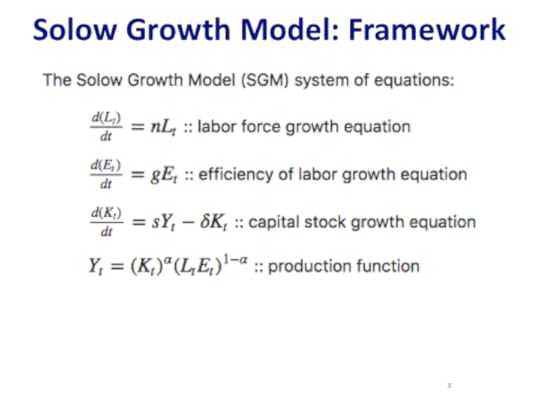
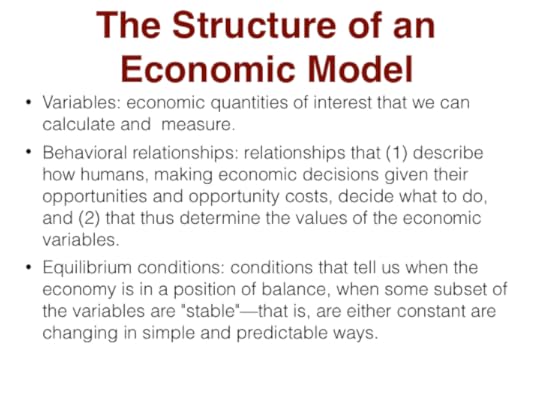
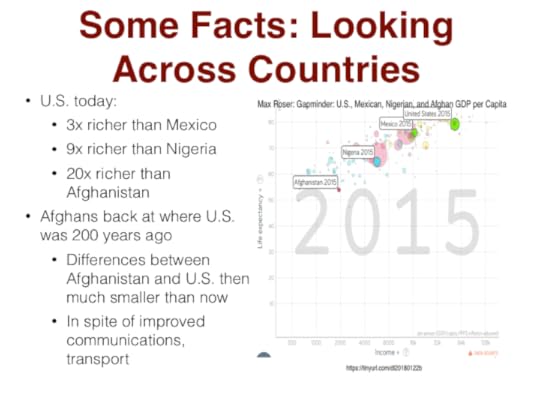
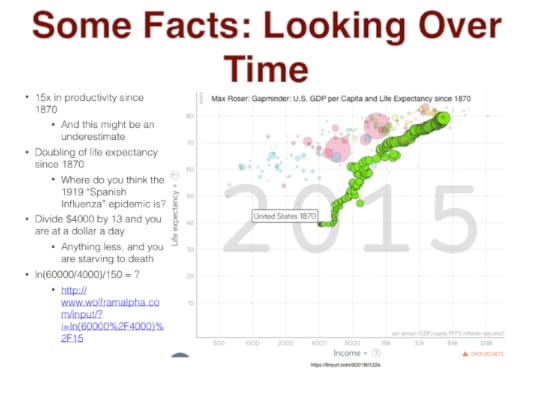
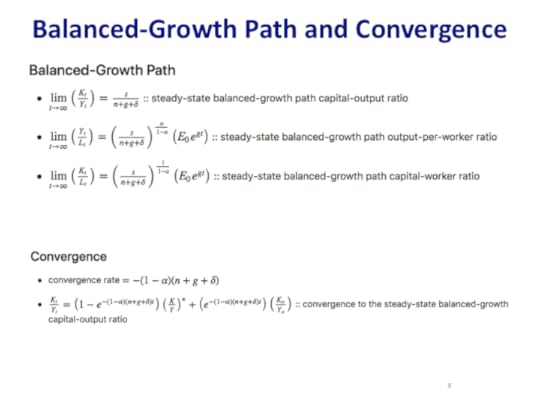
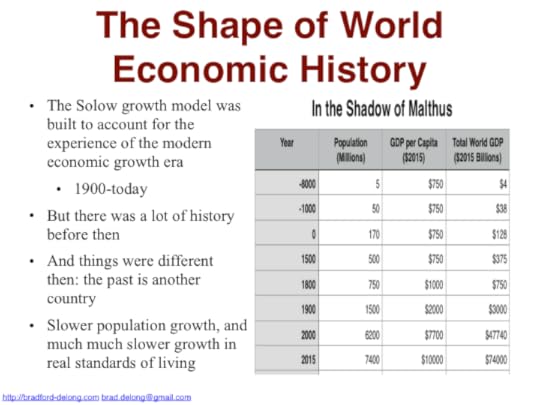
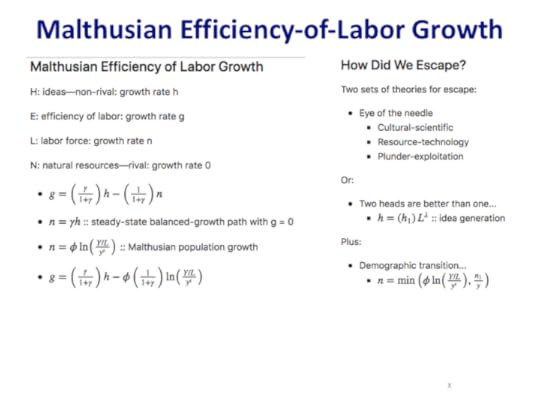
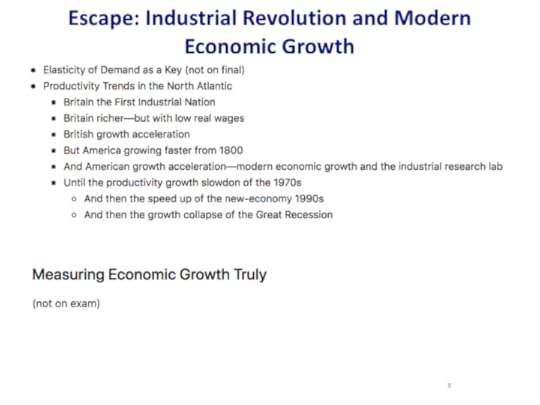
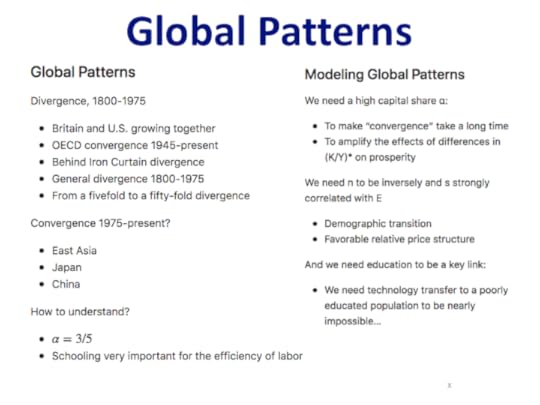
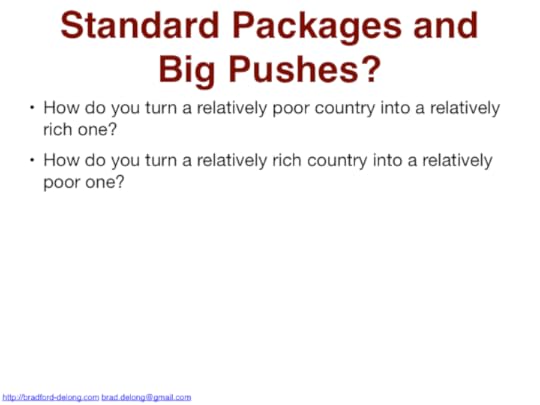
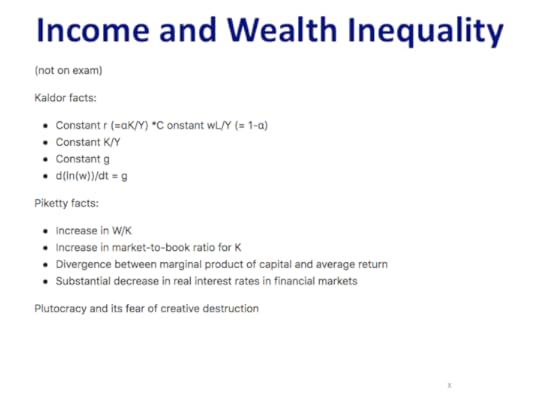
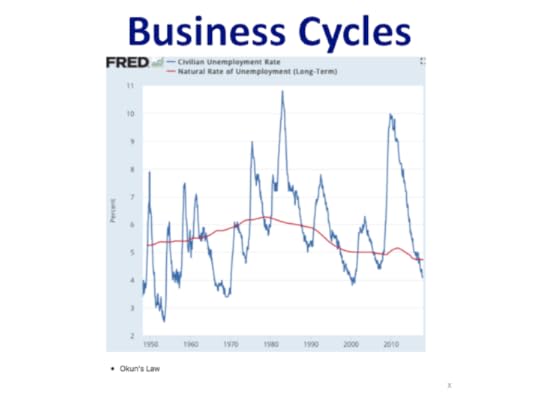
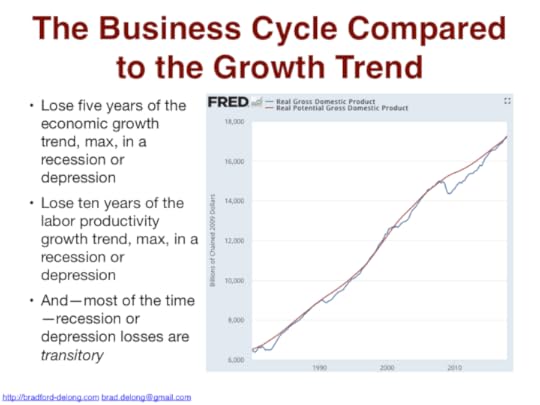
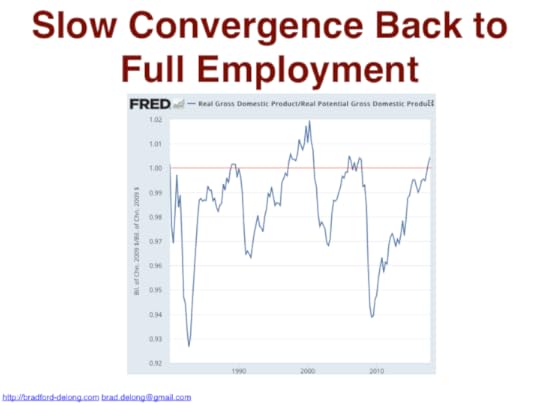
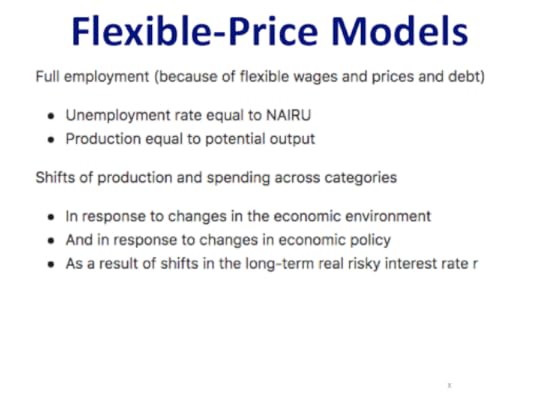
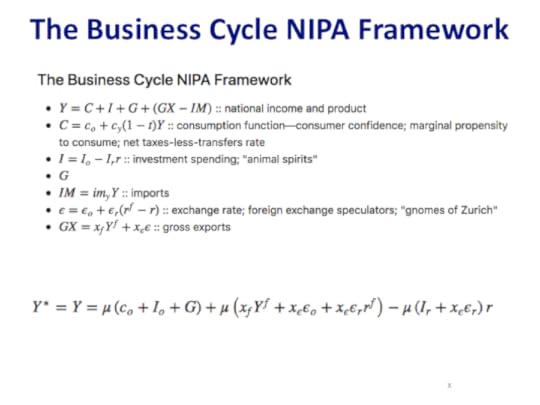
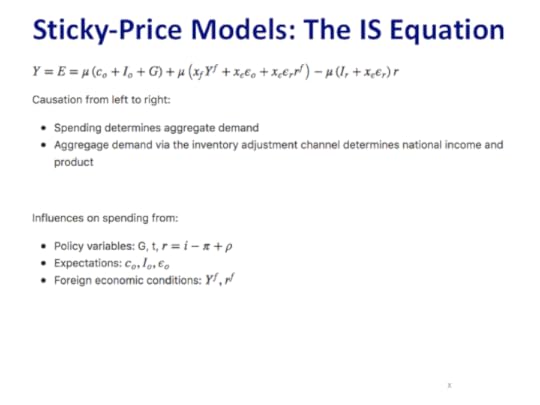
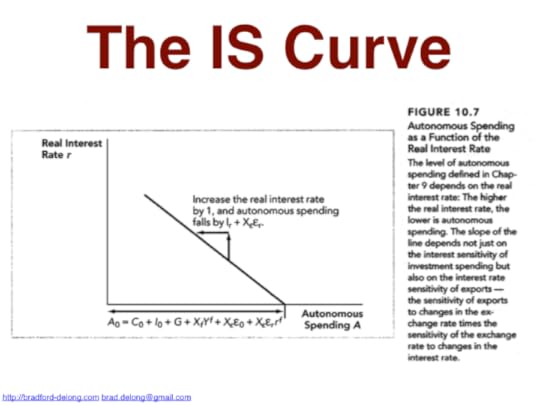
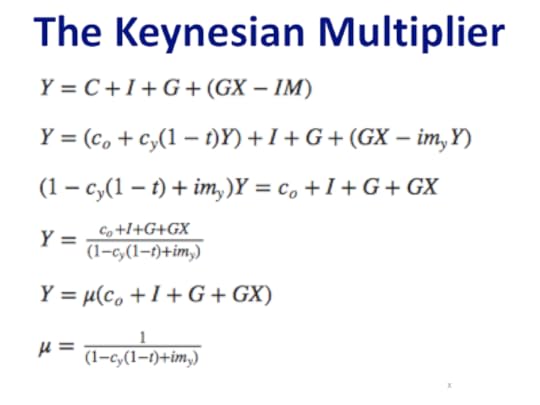
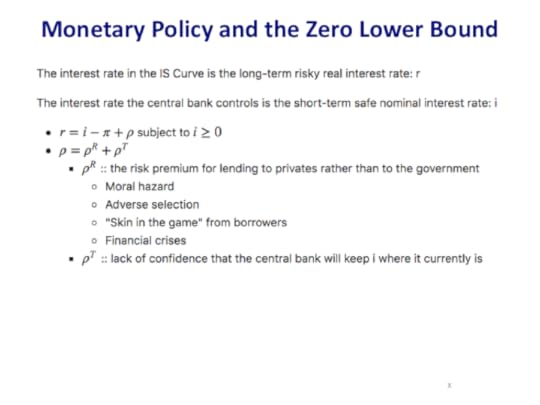
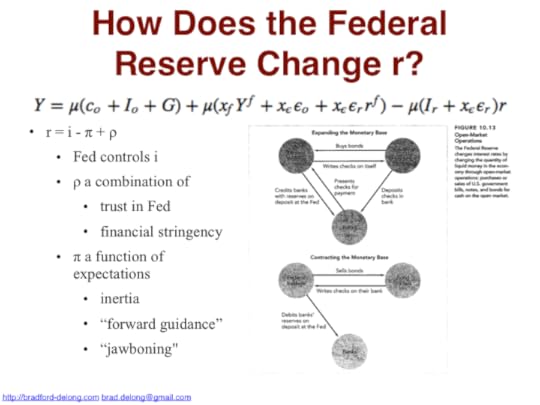
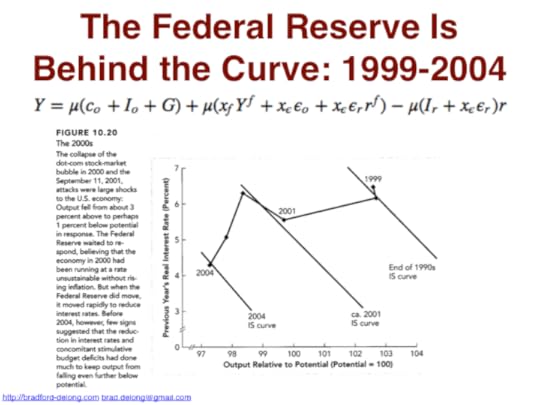
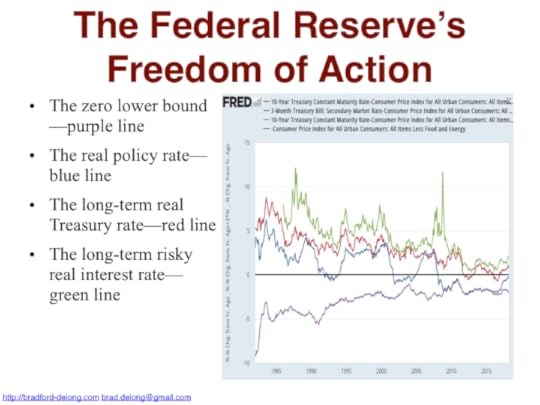
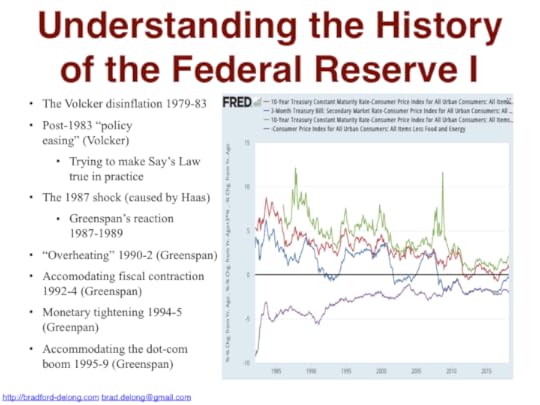
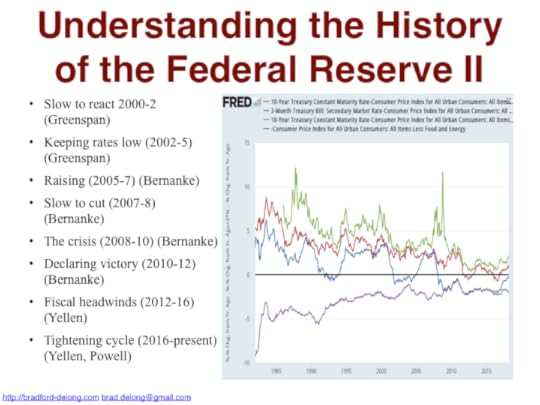
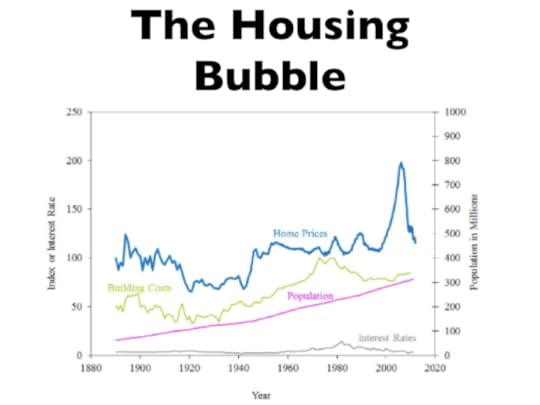
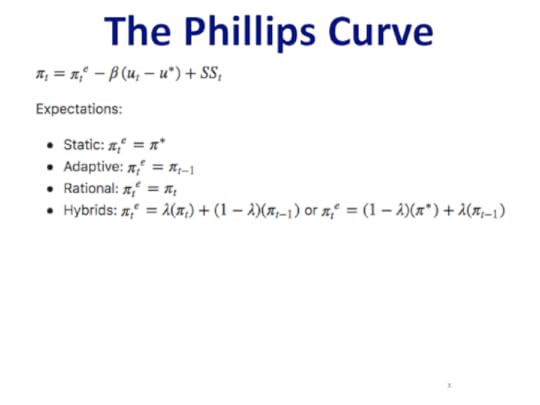
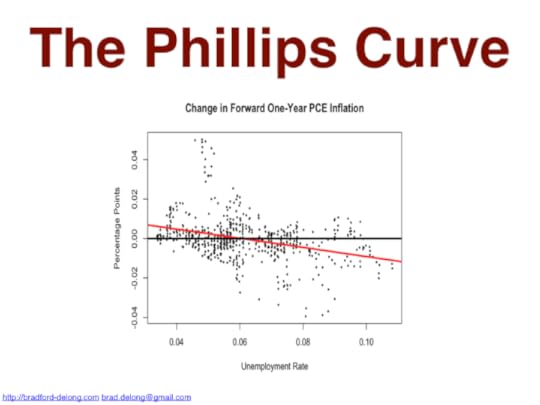
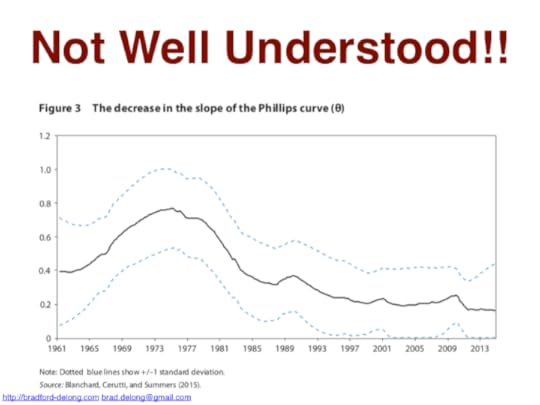
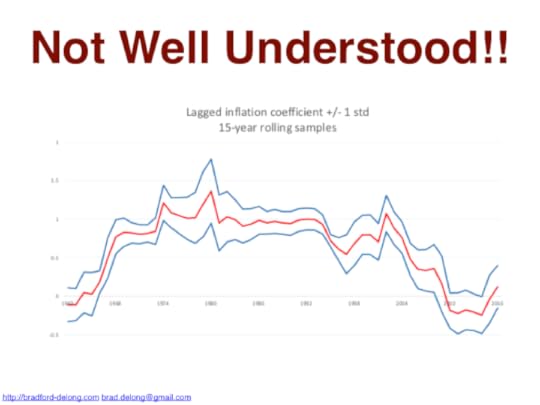
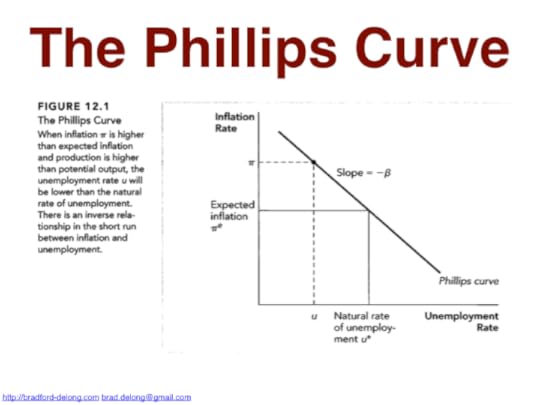
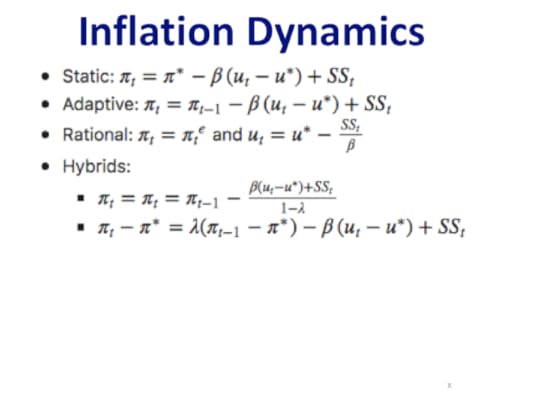
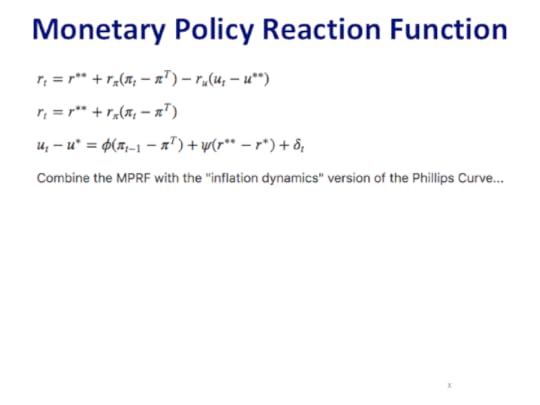
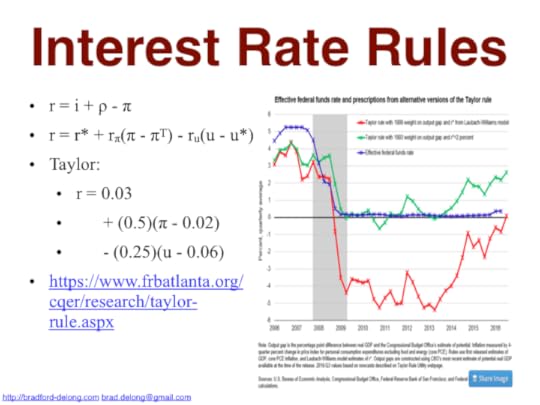
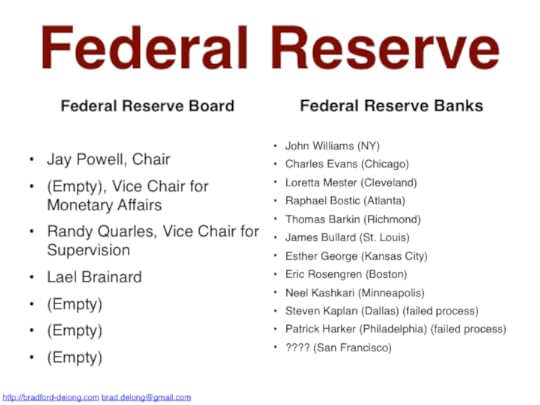
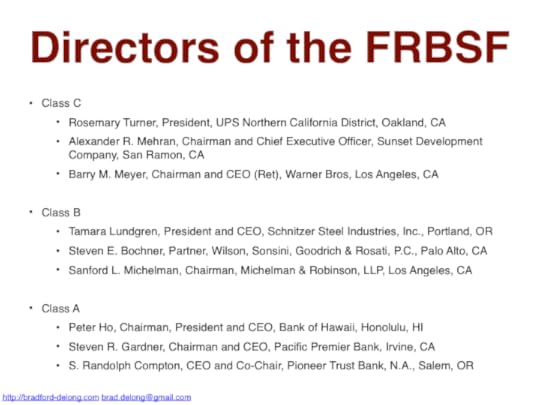
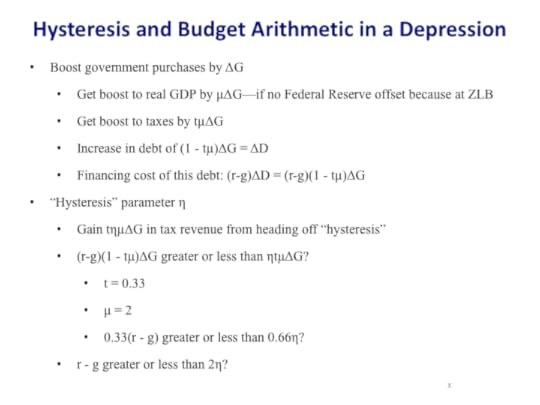
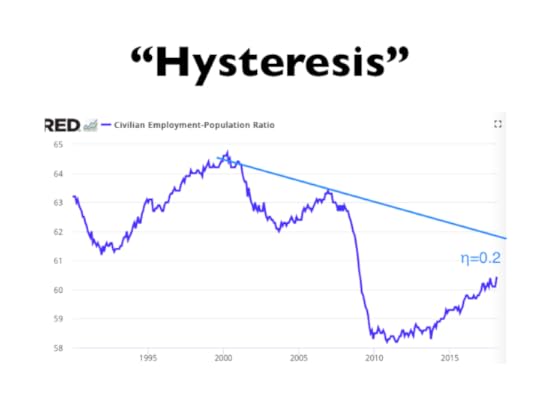
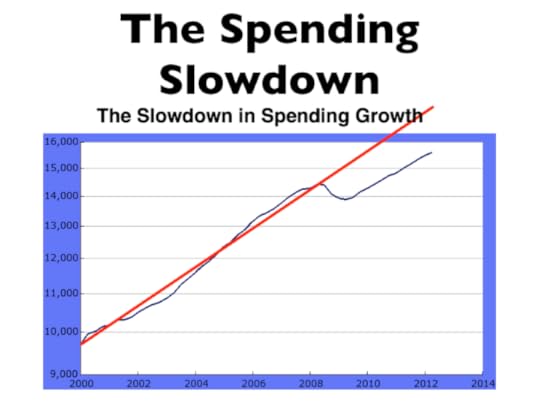
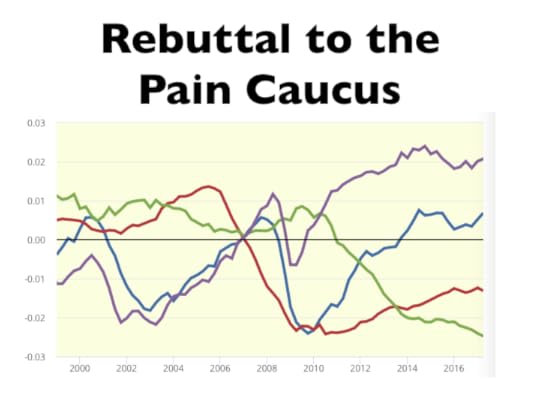
Yes, this is as bad a violation of academic standards as ...
Yes, this is as bad a violation of academic standards as it looks: Henry Farrell: The public choice of public choice: "Now this... 'financial ties to the Charles Koch Foundation... [but] George Mason University has cited its academic independence...
...Yet George Mason is less independent than it has let on, according to documents released last week via an open-records request.... Angel Cabrera, university president since 2012, shared the news with faculty members in an email, saying, ���I was made aware of a number of gift agreements that were accepted by the university between 2003 and 2011 and raise questions concerning donor influence in academic matters... granted donors some participation in faculty selection and evaluation,��� Cabrera said, noting that one such agreement is still active (the rest have expired). All 10 of the now-public agreements relate to the university���s Mercatus Center.... The two most recent, from 2007 and 2009, stipulate the creation of a five-member selection committee to select a professor, with two of those committee members chosen by donors. The other Koch agreement, from 1990, also afforded Koch a role in naming a professor to fund. George Mason also allowed Koch a role in evaluating professors��� performance via advisory boards. And while the agreements assert that final say in faculty appointments will be based on normal university procedures, the 2009 agreement says that funds will be returned to the donor if the provost and the selection committee can���t agree on a candidate....
The university has consistently said that the foundation is a private entity and that compromising the confidential nature of donations through that avenue by releasing such documents could chill giving. Koch was a joint, $10 million donor on the law school deal....
The ordinary protection against... donors using the university���s reputation as an ideological/financial cutout or flag of convenience is to build institutional firewalls, which allow donors to provide large money with broad conditions attached (such as: this money should be used to hire an endowed professor carrying out research and teaching on Topic X) but without specific controls on who that professor is.... It would appear that any such firewalls were comprehensively breached at George Mason University (which is a public university, with consequent public obligations). The ferocity of the university administration���s efforts to keep the arrangements secret suggest the reputational damage that the university now faces...
#shouldread
April 29, 2018
Gains from Trade: Is Comparative Advantage the Ideology of the Comparatively Advantaged?
Gains from Trade: Is Comparative Advantage the Ideology of the Comparatively Advantaged?: Trade, technology, job losses, and globalization���and their effects on prosperity and political turmoil.
Chair: Rohinton Medhora
Speakers: Brad Delong, Nadia Garbellini, Kaveh Majlesi, Arjun Jayadev
Discussant: Joseph Stiglitz, Pia Malaney
#shouldread
J. Bradford DeLong's Blog
- J. Bradford DeLong's profile
- 90 followers



